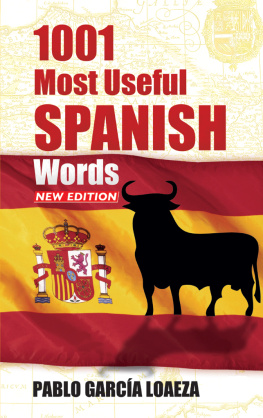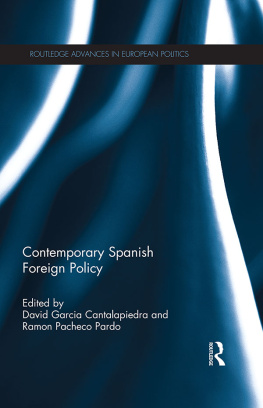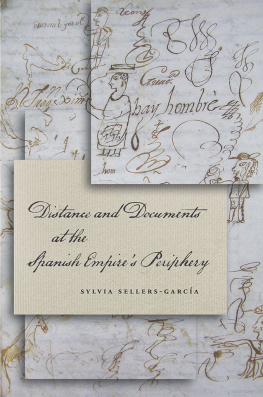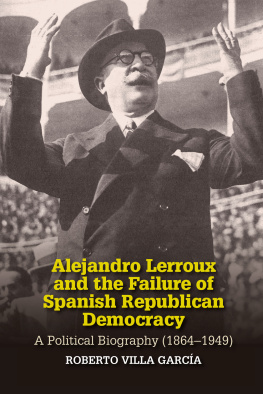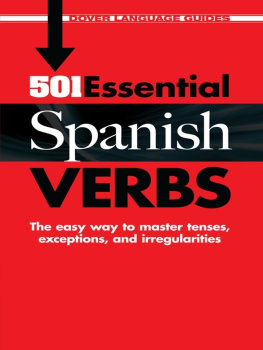2018 by University Press of Colorado
Published by University Press of Colorado
245 Century Circle, Suite 202
Louisville, Colorado 80027
All rights reserved

The University Press of Colorado is a proud member of the Association of University Presses.
The University Press of Colorado is a cooperative publishing enterprise supported, in part, by Adams State University, Colorado State University, Fort Lewis College, Metropolitan State University of Denver, Regis University, University of Colorado, University of Northern Colorado, Utah State University, and Western State Colorado University.
ISBN: 978-1-60732-800-1 (cloth)
ISBN: 978-1-60732-801-8 (ebook)
DOI: https://doi.org/10.5876/9781607328018
Library of Congress Cataloging-in-Publication Data
Names: Garca Soormally, Mina, 1972 author.
Title: Idolatry and the construction of the Spanish empire / by Mina Garca Soormally.
Description: Boulder : University Press of Colorado, [2018] | Includes bibliographical references and index.
Identifiers: LCCN 2018029735| ISBN 9781607328001 (cloth) | ISBN 9781607328018 (ebook)
Subjects: LCSH: IdolatryMexicoHistory. | Indians of MexicoReligion. | Catholic ChurchMexicoHistory. | MexicoReligion. | MexicoReligious life and customs. | MexicoHistorySpanish colony, 15401810.
Classification: LCC F1219.3.R38 G37 2018 | DDC 972/.01dc23
LC record available at https://lccn.loc.gov/2018029735
Cover illustrations: Mar del Nort by Johannes Jansson, 1650, courtesy of the David Rumsey Map Collection, www.davidrumsey.com (top); Columbus Taking Possession of the New World, public domain image from Library of Congress (bottom)
Early spring in Seville. As I type away on my computer, I listen to the horses clacking on top of the cobblestones. Clop, clop, clop, clop; and I suddenly realize that my typing has taken the same cadence, and the carriage is now marking my pace as well. I imagine, since the tall windows of the Archivo de Indias do not give me any other choice, a couple of tourists wearing big straw hats and loud-colored shirts who cant stop smiling while complaining about how hot it is.
The marching bands are already practicing their music for Holy Week while the store owners are getting ready for the avalanche of tourists that come with the good weather. From now on, and for a couple of months, the bottles of water will quadruple their price and McDonalds will house a thousand different languages at a time because, in the heat of Seville, who wants to be adventurous and try the traditional cuisine? But, as I reflect on these scenes I wonder, were we (Spaniards) always this open to foreigners? Did we always welcome other cultures, other lifestyles? Do we now?
While walking in the tangle of quaint winding streets and lovely plazas of the Jewish quarter, one could almost believe all the clichs: the smell of the orange blossoms dominates the air, the busy balconies hide the sky and, if you pay attention, you could probably hear a guitar in the distance. Every -other house sells postcards and cheap T-shirts accompanied by the typical pottery printed with Recuerdo de Sevilla. But, looking at one of our main sources of revenuethe tourist industryI have to ask myself, are we really open to foreigners, or just open for business? In other words, what role does the other, foreigners or outsiders, play in our scheme of things? How have Spaniards conceived their own identity throughout modernity?
Early Christianity sought to define who belonged and who didnt, what was accepted or not, in religious terms, setting the boundaries for what was considered the norm, while encoding beliefs and behavior in everyday lifediscriminating, therefore, between true and false religion. Following this tradition, Pedro Ciruelo (14701548), professor of theology and teacher to Philip II of Spain, when discussing the meaning of false doctrine wrote that, witchcraft and superstition deserve heavy punishment both from the prelates and by civil judges, as well as expulsion from the lands of Christian peoples as very evil and poisonous things which are known to be extremely prejudicial to the honor of God and very dangerous and hazardous for Christian souls, will be seen as a certainty. In the end, they draw down the anger of God upon the nations, cities and villages where they are tolerated (1977: 77).
This idea presents a component of inclusiveness/exclusiveness that makes the doctrine the perfect instrument to appeal to the right people. In this way Ciruelo presents the root of true religion while demonizing any ritual not sanctioned by the Catholic Church, establishing who, in his point of view, is in or out, who belongs and who does not.
However, as Christianity expanded and came into contact with other peoples and other forms of worship, it became impossible to keep true and false doctrine so neatly divided. Christian belief and practice thus resulted in an ever-changing dichotomy, playing differently in diverse circumstances, constantly defining and rearticulating the reality that it was trying to label. Encountering the other produced a multilayered religiosity that combined orthodox Christian beliefs and pre-Christian rituals; that is, behaviors and beliefs that the Christian authorities would ultimately call idolatry.
Idolatry is a concept that, throughout history, has determined the life or, more accurately, the death of many individuals in Europe and its colonies. But what exactly is idolatry? What characteristics define it? What is its relationship with heresy and apostasy? How was it used at the time the Americas were colonized? How was this concept transformed as a result? These are some of the questions I will address in the following chapters. In them I will show that idolatry does not have a single meaning, but rather it is an ever-changing concept, polyvalent in nature, used and redefined in very different instances and contexts. It is, then, a malleable concept and so are its applications, making it a very interesting point of reference in the Early Modern period. Recovering this concept is of great importance since it speaks of some crucial behavior in particular spaces and times, and it is embedded in the process of socialization itself. It refers both to the nature of those who use it and of those who are labeled by it and reaches deeply into the fundamental mechanisms of hegemony.
The arrival of colonizers in the new territories occurred in the midst of a debate over idolatry that was taking place throughout Europe and which later continued in the New World. They were times of self-definition, but the new circumstances made the task that much bigger: it was then Spains duty to incorporate this New World into the known one, to create a place for these new peoples in the European scheme, and to establish a relationship with the colonized other.
In this crossroad, Spain used the concept of idolatry to label not only that which was undesirable, but especially that which was unknown. The self-centered attitude that Spaniards brought with them was not only noticeable in the way they baptized the newly discovered as Indians but also in the manner they treated their cosmology, culture, religion, and way of life. The discovery, therefore, not only implied a position relative to the


 The University Press of Colorado is a proud member of the Association of University Presses.
The University Press of Colorado is a proud member of the Association of University Presses.


